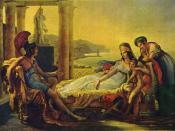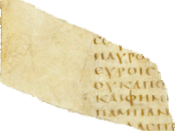In The Medea by Euripides and The Aeneid by Virgil the characters of Medea and Dido respond to desertion by their husbands, the individual they love most, in the form of a quarrel. Both characters go on to attempt to alleviate their pain via revenge. Their judgments and actions are impaired by each woman's great eros and amor. Euripides and Virgil illustrate their vision of passion and love through the effects of Medea and Dido's actions under the influence of these emotions. Both women could choose a healthier course for their pain by thinking rationally. Ultimately what matters is Medea is permitted to be distressed because she truly is abandoned by her husband, while Dido, on the other hand, is betrayed and destroyed by a lover she cons herself into believing is her husband.
In response to the abandonment of their lovers, both Medea and Dido quarrel with their "husband" in an effort to sway him into altering his resolution.
Medea attempts to make Jason leave his new bride and come back to her while Dido tries to influence Aeneas into staying with her. Each woman vents by launching their monologue with an introduction of insults. Although Medea straight forwardly calls Jason a "coward in every way", Dido is more controlled and implies that Aeneas attempts to "slip away in silence" (Euripides, 465) (Virgil, IV.419). Throughout the remainder of the speeches, they attempt to get the men to bend to their wishes. The women use logic. Medea reminds Jason of the shame he will face as a result of having children wandering as beggars. Dido informs Aeneas of the bad weather he will encounter if he leaves now. Both women remind their lover of all they have sacrificed for him and everything they have not asked for in...


